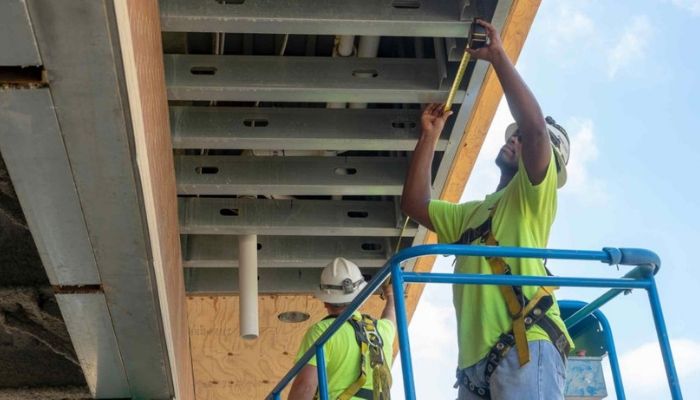Self-perform work is a part of a general contractor that is not discussed enough. When self-performing, the lead general contractor on a project completes certain construction activities, such as demolition, rough & finish carpentry, casework, doors & hardware, and framing & drywall with its own skilled labor force.
In almost every project, self-performing certain scopes of work can benefit the project. More importantly, self-perform capabilities add value to all clients. HarenLaughlin has utilized self-perform crews on the Mahaffie Farmstead, The District at City Center, on multiple projects with the City of Olathe, and many of our larger projects.
Self-performing can serve the project in four ways:
Cost Savings
Self-performing generates a thorough knowledge of task-related labor necessities, material options and availability, and market fluctuations that affect both. During preconstruction, the lead contractor’s self-perform knowledge provides owners and architects with accurate budget information for their designs as well as viable material alternatives. Having worked with a variety of materials, the general contractor can recommend selections that will provide the best value for each project.
Competitive Scheduling
Contractors that self-perform have the experience of completing the work. This understanding of the tasks being completed by subcontractors results in time savings through:
- Efficient scheduling – Trade-specific experience leads to creating accurate, efficient, dependable schedules.
- Faster team building – Self-performing reduces the time required to complete subcontractor selection and onboarding.
- Flexibility – If a subcontractor falls behind schedule and is unable to recover using alternative solutions, self-perform gives the general contractor the last-resort option to supplement that subcontractor’s workforce with in-house skilled laborers to get the project back on track.
- Motivation – Inherently, the lead contractor has a greater incentive for completing self-perform work on time and within budget than the subcontractors.
- Control – Self-performing heightens the ability to manage the schedule by using internal forces to perform the work.
Quality Always
After years of building a talented team of craft workers, self-perform contractors have concrete finishers, carpenters, and millworkers at their fingertips. Self-perform crews that have worked together on project after project yield high-quality products through efficient methods. When our own forces are responsible for work on site, we can guarantee excellent quality as well as on-time, on-budget completion of those trades.
Safety First
When an experienced self-perform crew works on project sites, they follow and enforce the lead contractor’s safety standards, enhancing the safety focus already provided by an in-house safety department and individual project teams. Skilled laborers on-site offer extra sets of trained eyes to watch for and correct risky behaviors.
Self-performing is not the right call for every project, but having a self-perform contractor affords many options and added value. Even without self-performing on a project, having self-perform knowledge and experience improves the ability to assess subcontractors’ work and hold them accountable in terms of staffing, scheduling, estimating, and quality. With a high value for self-performing work, a general contractor is not a simply a construction manager but offers its clients the expertise of a true builder on every project.

Leave A Comment
You must be logged in to post a comment.